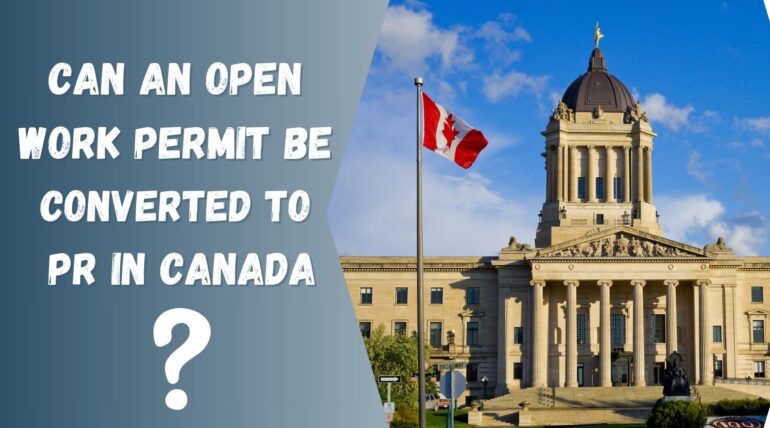
July 3, 2024
Navigating the path from an open work permit to permanent residency in Canada can be a daunting task for international students. However, it’s an achievable dream for many. This guide will break down the steps, options, and tips to help you transition smoothly and successfully.
Why Consider Transitioning from an Open Work Permit to PR?
Canada offers a myriad of opportunities for international students. Staying on as a permanent resident allows you to fully access these benefits, including better job prospects, healthcare, and the possibility of citizenship. Permanent residency also gives you the freedom to live and work anywhere in Canada, enhancing your quality of life.
Understanding Open Work Permits
An open work permit allows you to work for any employer in Canada, giving you the flexibility to gain valuable work experience. This type of permit is often issued to spouses of international students or skilled workers, recent graduates of Canadian institutions, and other specific groups. Knowing the constraints and freedoms of an open work permit is essential before making any major decisions.
The Importance of Canadian Work Experience
Having Canadian work experience can be a significant advantage when applying for PR. Most immigration pathways value work experience gained in Canada. It demonstrates your ability to adapt to the Canadian work environment, which can be a crucial factor in your PR application.
Exploring Different Pathways to PR
Canada offers multiple pathways to PR for those holding an open work permit. Some of the most popular ones include:
- Express Entry – A point-based system that evaluates candidates based on their skills, work experience, and other factors.
- Provincial Nominee Programs (PNPs) – Each province has its own set of criteria and streams. Getting a nomination from a province can significantly boost your chances.
- Canadian Experience Class (CEC) – Specifically designed for those with Canadian work experience, this stream within Express Entry is ideal for international students and temporary workers.
Express Entry Basics
Express Entry is a quick and efficient way to attain PR. It involves submitting an online profile that is scored using the Comprehensive Ranking System (CRS). Factors like age, education, work experience, and language proficiency contribute to your CRS score. Regular draws are held, and those with the highest scores are invited to apply for PR.
Navigating Provincial Nominee Programs (PNPs)
Each province in Canada has its own PNP, which allows them to nominate individuals for PR based on their specific labor market needs. If you have ties to a particular province, such as a job offer or previous study experience, you may have a higher chance of getting a nomination.
The Canadian Experience Class (CEC)
The CEC is part of the Express Entry system and is designed for individuals with at least one year of skilled work experience in Canada. This pathway is particularly popular among international students who have transitioned to an open work permit after graduation. The CEC prioritizes those who have proven they can integrate into the Canadian workforce.
Language Proficiency and Its Role in PR Applications
Language skills in either English or French are critical for PR applications. The better your language proficiency, the higher your CRS score will be. Taking language tests like IELTS or CELPIP early in the process can give you a clearer idea of where you stand and what areas need improvement.
Gathering Necessary Documentation
Documentation is a crucial part of your PR application. Ensure you have all required documents, such as proof of work experience, educational credentials, language test results, and other supporting materials. Keeping these documents organized and up-to-date will make the application process smoother.
Seeking Professional Guidance
Working with a Canada visa consultant in Pehowa can provide you with personalized advice and help you avoid common pitfalls. Consultants are well-versed in immigration laws and can guide you through the complexities of the application process.
The Role of Education in Your PR Journey
Your educational background plays a significant role in your PR application. Higher educational qualifications can improve your CRS score and make you a more attractive candidate. If you’re considering further studies, doing so in Canada can enhance your profile.
Building a Strong Network
Networking can be a powerful tool in your PR journey. Connecting with other international students, alumni, and professionals in your field can provide you with invaluable insights and opportunities. Attend industry events, join professional organizations, and leverage social media to build your network.
Staying Informed About Policy Changes
Immigration policies in Canada are subject to change. Staying informed about the latest updates can give you a competitive edge. Follow official immigration websites, join forums, and subscribe to newsletters to keep abreast of any changes that might affect your application.
Overcoming Common Challenges
The path to PR is filled with challenges, but being prepared can help you overcome them. Common obstacles include meeting language requirements, gathering sufficient work experience, and navigating the complexities of the application process. Understanding these challenges and seeking help when needed can make a significant difference.
Conclusion
Achieving permanent residency in Canada is a rewarding goal for international students. By understanding the various pathways, gathering the necessary documents, and seeking professional guidance, you can improve your chances of success. Remember, staying informed and proactive will put you on the right track. Ready to take the next step? Contact a Canada visa consultant in Pehowa for personalized advice and start your PR application process today.





